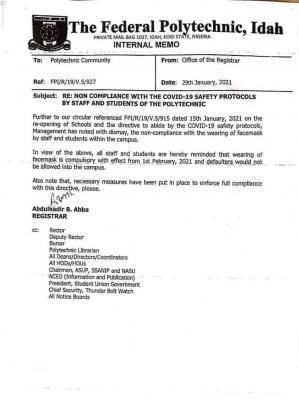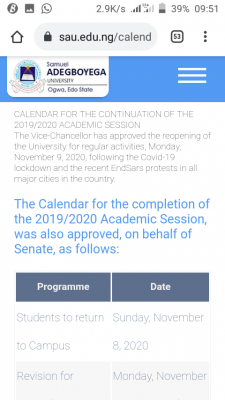
The popular saying that a nation is as good as the quality of its education could literary mean that the quality of education of a particular nation is directly proportional to the quality of its human resources and economic growth.
This is measured by the proportion of policies that are implemented in actual terms, in which case the government maintains the deciding factors.
In Nigeria, the case in Nigeria over the years has been that where more policies, programmes, approvals and directives are provided than the actual implementation of such, indicating an apparent failure of the government’s commitment to transform the nation.
Therefore, when the 59th National Council on Education (NCE) meeting opened in Abuja recently, it was largely expected that deliberations and decisions made at the annual gathering of who-is-who in the nation’s education sector would be to transform the fate of the sector from its current state to a better position.
True to expectation, quite a number of far reaching decisions were made at the five days meeting. And for years to come, such decisions are not only expected to have been implemented to the letter but also have desired impacts on the nation’s education sector.
However, not many observers of events in the education sector expressed would optimism that the meeting can have any positive effect on the troubled sector because according to them, previous meetings have yielded little or nothing.
The widespread belief is that the problem with Nigeria and its various sectors, education inclusive is not lack of good policies but the actual implementation of same has been the clog in the wheel of progress of Nigeria as a nation.
Those who share this thought are of the opinion that lack of implementation of decisions made at each and every NCE meeting is the bane of federal government’s commitment to the annual gathering.
To many of them, the gathering of all stakeholders in the nation’s education sector has become nothing less than a jamboree where government only expend financial resources to entertain participants rather than have results in terms of transforming the sector.
For instance, the NCE gave some directives which expectedly should be carried out with immediate effect to the benefit of the education sector.
Such directives included the one given to the National Examination Council (NECO) that it must produce and release all outstanding certificates before the next NCE meeting and thereafter ensure release of certificates before the conduct of similar examinations;
The NCE also directed relevant regulatory agencies and institutions to recognise and accept Senior Arabic and Islamic School Certificate (SAISSC) for admission into tertiary institutions.
It also asked the Federal Ministry of Education to liaise with the Directorate of National Youth Service Corps (NYSC) to enlist Early Child Care Development Education (ECCDE) campaign in her community development activities.
Other directives are that the Federal Ministry of Education should liaise with the Federal Ministry of Industry, Trade and Investments to ensure that the Industrial Training Fund (ITF) caters for and supervises Technical College students on SIWES.
The National Teachers’ Institute (NTI) should interface with Nigerian Educational Research Development Council (NERDC) on the Teacher Education in Sub-Saharan Africa (TESSA) toolkit for teaching practice Supervision for assessment and quality assurance.
It asked the National Universities Commission (NUC), National Board for Technical Education (NBTE) and National Commission for Colleges of Education to ensure that all lecturers in tertiary institutions possess teaching qualifications in conformity with the provision of the National Policy on Education and that NUC should sanction universities that charge above the approved Post-UTME fee of N2, 000.
The Council also directed NERDC to produce implementation guidelines for the 2013 6th edition of the National Policy on Education.
It also gave approvals to some proposals brought before it. Some of the approvals include the implementation of the revised 9-Year Basic Education Curriculum, with effect from 2014 beginning with Primary 1 and Junior Secondary School 1; the admission ratio of students in Science and Trade subjects into Technical Colleges should be 30:70 respectively.
It was also approved that every student in Federal and State Science and Technical Colleges must offer a Technical subject; even as approval was also given to the re-activation of Teacher Vacation Course (TVC) by Federal Ministry of Education, states and Federal Capital Territory in collaboration with professional associations and subject specialists.
Due to their peculiarities as persons with special needs, the Council also gave approval to the National Policy on Albinism and Implementation Guidelines; as well as approved the incorporation of the 1-year pre-primary education into the existing 6-3-3-4 to become 1-6-3-3-4.
The adoption and implementation of the strategic plan for establishing Enterprise education units and development of Enterprise Programmes and Activities in Senior Secondary Schools was also among the approvals made at this year meeting.
But laudable as these directives and approvals appear to be, the NCE meeting according to renown educationist and Chairman, West African Examination Council (WAEC), Professor Pai Obanya, is just a mere jamboree. He carpeted government for assembling stakeholders in education sector annually only to churn out faulty policies.
Professor Obanya particularly faulted the 9-year basic education curriculum developed by the Nigerian Educational Research and Development Council (NERDC) and approved by the 59th NCE. The policy, he noted would be difficult to implement.
The NCE meeting which held between June 24 and 28 with the theme: “Strengthening the Institutional Management of Education for Quality Service Delivery” was chaired by the Minister of Education, Professor Ruqqayatu Ahmed Rufai. ‘It was originally slated to hold in Port Harcourt, Rivers state but was brought to Abuja due to compelling reasons’ the Minister said.
And if the zeal with which the Minister coordinated the last day of the meeting was anything to go by, then decisions reached at the event ought not to end on papers. Professor Rufai anchored the revision, amendment and final issuance of the communiqué at the end of the meeting. Surprisingly, she was at the International Conference Centre, Abuja, venue of the meeting till almost mid night.
As if to underscore that the NCE which is the highest decision body making in the nation’s education sector was fast becoming a mere talk show, Professor Rufai could not hide her displeasure over the implementation of past NCE decisions.
It was no surprise therefore, when in her opening remarks at the meeting, the Minister said that some of the decisions made at each and every meeting of the Council ended up as mere paper work.
Her words: “I wish to express the Federal Ministry of Education’s position as regards the implementation of past NCE decisions. We have observed that some of these decisions taken at the highest level of the education policy making body, the National Council on Education (NCE) end up as mere paper work.”
“It is disheartening that government will expend financial and material resources for these meetings for the benefit of our children and at the end of the day, the decisions are never implemented. May I reiterate that it is quite worrisome to the federal government that decisions taken by NCE are not implemented by all stakeholders.”
The Minister had characteristically reeled out efforts made by the federal government through her ministry to turn around the fate of the sector. According to her, the meeting was a good avenue to take stock of the progress made in the sector, identify grey areas and consider policy options that would enable government move the sector to better heights.
She told the gathering that the federal government had adopted some strategic priority programmes which included National Campaigns on Access, Almajiri education programme, back to school drives, adult and mass literacy and albinism education.
The Almajiri education programme was launched in Sokoto as part of government’s strategies to reduce the number of out-of-school children in the country. It is currently estimated that Nigeria has over 10 million out of school children. It is designed to mainstream the Almajiri system into basic education, thereby providing them with the opportunity to develop skills that will make them to contribute to national development.
Textbooks in eleven subjects have been produced for use in the schools nationwide while 89 Almajiri model schools are under construction in 27 states and FCT. Twenty three of the schools have been handed over to states such as Bauchi, Zamfara, Oyo, Adamawa, Jigawa, Borno, Edo, Kaduna, Kano, Katsina, Lagos and Ogun.
She also mentioned the incorporation of One-Year Pre-Primary education into the education system to become 1-6-3-3-4 and establishment of 12 new Federal Universities to increase access to education.
Beyond all these developments given by the Minister, the core concerns of many Nigerians who have heard about the various policies approved and directives given at the 59th session of NCE is how will these transform to an improved education sector in the next five years at least.
Will all the decisions not go the ways of those of the past? End up in files under book shelves. This is a poser waiting to be answered. But as it is often said, time will tell whether the 59th NCE was just another talk show, at least, when the 60th session convenes in Ogun state, the Federal Ministry of Education should be bold enough to tell Nigerians how many of this decisions have been implemented and with what effect.
And before then, critics and Nigerians are watching the various events that are unfolding in the education sector and how they are shaping not only the sector but the generality of the nation’s economic growth and development.




